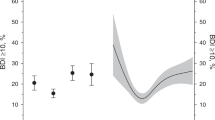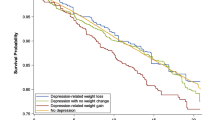Abstract
Background/Objectives:
Decades of research have investigated the association between body mass index (BMI) and depression. Although it has been suggested that obesity lowers the risk of depression in elderly adults, the association of overweight and obesity with depression across age groups remains controversial. Thus, we aimed to investigate how the odds of depression vary between BMI groups in the general population.
Subjects/Methods:
In this study, data were collected from the sixth Korea National Health and Nutrition Examination Survey of 2014 (KNHANES VI; n=7550), and 4932 adults were included in the study sample. We investigated the adjusted association between depression, which was measured by the Patient Health Questionnaire 9 (PHQ-9), and BMI groups (underweight, normal weight, overweight, obese class I, obese classes II and III).
Results:
In all adults, after adjusting for sex, age, income and presence of chronic illnesses, overweight had lower odds of depression than normal weight (OR, 0.811; 95% CI, 0.661–0.995), whereas underweight had higher odds of depression than normal-weight subjects (OR, 1.776; 95% CI, 1.241–2.540). Overweight elderly adults had lower odds of depression than normal-weight elderly adults (OR, 0.522, 95% CI, 0.367–0.743), and obese class I elderly adults also had lower odds of depression than normal-weight elderly adults in both men (OR, 0.482, 95% CI, 0.251–0.924) and women (OR, 0.637, 95% CI, 0.418–0.970). Furthermore, in the normal-weight-to-obese class I elderly adults group, we found that an increase of 1 kg m−2 BMI was significantly associated with a decreased prevalence of depression in both men (OR, 0.898, 95% CI, 0.808–0.997) and women (OR, 0.911, 95% CI, 0.844–0.982).
Conclusions:
We found that overweight and mild obesity significantly lowered the risk of depression in elderly adults. These findings suggest that mild increases in BMI beyond the normal range may be a protective factor for depression in elderly Korean adults.
This is a preview of subscription content, access via your institution
Access options
Subscribe to this journal
Receive 12 print issues and online access
$259.00 per year
only $21.58 per issue
Buy this article
- Purchase on Springer Link
- Instant access to full article PDF
Prices may be subject to local taxes which are calculated during checkout




Similar content being viewed by others
References
Faith MS, Matz PE, Jorge MA . Obesity-depression associations in the population. J Psychosom Res 2002; 53: 935–942.
Luppino FS, de Wit LM, Bouvy PF, Stijnen T, Cuijpers P, Penninx BWJH et al. Overweight, obesity, and depression: a systematic review and meta-analysis of longitudinal studies. Arch Gen Psychiatry 2010; 67: 220–229.
de Wit LM, van Straten A, van Herten M, BWJH Penninx, Cuijpers P . Depression and body mass index, a u-shaped association. BMC Public Health 2009; 9: 14.
de Wit L, Luppino F, van Straten A, Penninx B, Zitman F, Cuijpers P . Depression and obesity: a meta-analysis of community-based studies. Psychiatry Res 2010; 178: 230–235.
Onyike CU, Crum RM, Lee HB, Lyketsos CG, Eaton WW . Is obesity associated with major depression? Results from the Third National Health and Nutrition Examination Survey. Am J Epidemiol 2003; 158: 1139–1147.
Ma Xiao J L . Obesity and depression in US women: results from the 2005-2006 National Health and Nutritional Examination Survey. Obesity 2010; 18: 347–353.
Assari S . Association between obesity and depression among american blacks: role of ethnicity and gender | springerlink. J Racial Ethn Health Disparities 2014; 1: 36–44.
Kim J-Y, Chang H-M, Cho J-J, Yoo S-H, Kim S-Y . Relationship between obesity and depression in the Korean working population. J Korean Med Sci 2010; 25: 1560–1567.
Flegal KM, Kit BK, Orpana H, Graubard BI . Association of all-cause mortality with overweight and obesity using standard body mass index categories: a systematic review and meta-analysis. JAMA 2013; 309: 71–82.
Wang Z, Liu M, Pan T, Tong S . Lower mortality associated with overweight in the US National Health Interview Survey: is overweight protective? Medicine 2016; 95: e2424.
Flegal KM, Kalantar-Zadeh K . Overweight, mortality and survival. Obesity 2013; 21: 1744–1745.
Penninx BW, Beekman AT, Honig A, Deeg DJ, Schoevers RA, van Eijk JT et al. Depression and cardiac mortality: results from a community-based longitudinal study. Arch Gen Psychiatry 2001; 58: 221–227.
Van der Kooy K, van Hout H, Marwijk H, Marten H, Stehouwer C, Beekman A . Depression and the risk for cardiovascular diseases: systematic review and meta analysis. Int J Geriatr Psychiatry 2007; 22: 613–626.
World Health Organization World Health Statistics 2015. World Health Organization: Geneva, Switzerland, 2015.
Kim HT . Addressing the suicide rate in South Korea. A with Honors Projects 2016; 165. Available at: http://spark.parkland.edu/ah/165.
Park JH, Kim KW, Kim M-H, Kim MD, Kim B-J, Kim S-K et al. A nationwide survey on the prevalence and risk factors of late life depression in South Korea. J Affect Disord 2012; 138: 34–40.
Cho MJ, Nam JJ, Suh GH . Prevalence of symptoms of depression in a nationwide sample of Korean adults. Psychiatry Res 1998; 81: 341–352.
Kroenke K, Spitzer RL, Williams JB . The PHQ-9: validity of a brief depression severity measure. J Gen Intern Med 2001; 16: 606–613.
Romero-Corral A, Somers VK, Sierra-Johnson J, Thomas RJ, Collazo-Clavell ML, Korinek J et al. Accuracy of body mass index in diagnosing obesity in the adult general population. Int J Obes 2008; 32: 959–966.
Byun J-S . The Korean Association for Survey Research. Sampling design of the 6th KNHANES and weighting adjustment of the 5th (2010–2012). Korea Centers for Disease Control and Prevention. 2013. Available at: http://cdc.go.kr/CDC/cms/cmsFileDownload.jsp?fid=28&cid=20589&fieldName=attach1&index=1.
Zheng W, McLerran DF, Rolland B, Zhang X, Inoue M, Matsuo K et al. Association between body-mass index and risk of death in more than 1 million Asians. N Engl J Med 2011; 364: 719–729.
Lee W-Y, Park J-S, Noh S-Y, Rhee E-J, Kim S-W, Zimmet PZ . Prevalence of the metabolic syndrome among 40,698 Korean metropolitan subjects. Diabetes Res Clin Pract 2004; 65: 143–149.
Martin A, Rief W, Klaiberg A, Braehler E . Validity of the Brief Patient Health Questionnaire Mood Scale (PHQ-9) in the general population. Gen Hosp Psychiatry 2006; 28: 71–77.
Löwe B, Kroenke K, Herzog W, Gräfe K . Measuring depression outcome with a brief self-report instrument: sensitivity to change of the Patient Health Questionnaire (PHQ-9). J Affect Disord 2004; 81: 61–66.
Williams LS, Brizendine EJ, Plue L, Bakas T, Tu W, Hendrie H et al. Performance of the PHQ-9 as a screening tool for depression after stroke. Stroke 2005; 36: 635–638.
Han C, Jo SA, Kwak J-H, Pae C-U, Steffens D, Jo I et al. Validation of the Patient Health Questionnaire-9 Korean version in the elderly population: the Ansan Geriatric study. Compr Psychiatry 2008; 49: 218–223.
Ministry of Health and Welfare. National Health and Nutrition Survey Resource Guide: the sixth KNHANES (2013-2015). Korea Center for Disease Control and Prevention. 2015. Available at: http://cdc.go.kr/CDC/contents/CdcKrContentView.jsp?cid=60945&menuIds=HOME001-MNU1130-MNU1639-MNU1748-MNU1757.
Ortman JM, Velkoff VA, Hogan H 2014. An aging nation: the older population in the United States.U.S. Census Bureau, Washington, 2014.
Kim Y . The Korea National Health and Nutrition Examination Survey (KNHANES): current status and challenges. Epidemiol Health 2014; 36: e2014002.
Park JH, Kim KW . A review of the epidemiology of depression in Korea. J Korean Med Assoc 2011; 54: 362–369.
Crisp AH, McGuiness B . Jolly fat: relation between obesity and psychoneurosis in general population. Br Med J 1976; 1: 7–9.
Kim E, Song JH, Hwang J-Y, Ahn K, Kim J, Koh YH et al. Obesity and depressive symptoms in elderly Koreans: evidence for the ‘Jolly Fat’ hypothesis from the Ansan Geriatric (AGE) Study. Arch Gerontol Geriatr 2010; 51: 231–234.
Dearborn PJ, Robbins MA, Elias MF . Challenging the ‘jolly fat’ hypothesis among older adults: High body mass index predicts increases in depressive symptoms over a 5-year period. J Health Psychol 2016. doi: 10.1177/1359105316675209.
Ogden CL, Carroll MD, Kit BK, Flegal KM . Prevalence of childhood and adult obesity in the United States, 2011-2012. JAMA 2014; 311: 806–814.
WHO Expert Consultation. Appropriate body-mass index for Asian populations and its implications for policy and intervention strategies. Lancet 2004; 363: 157–163.
Wassertheil-Smoller S, Shumaker S, Ockene J, Talavera GA, Greenland P, Cochrane B et al. Depression and cardiovascular sequelae in postmenopausal women. The Women's Health Initiative (WHI). Arch Intern Med 2004; 164: 289–298.
Author information
Authors and Affiliations
Corresponding author
Ethics declarations
Competing interests
The authors declare no conflict of interest.
Additional information
Supplementary Information accompanies this paper on International Journal of Obesity website
Supplementary information
Rights and permissions
About this article
Cite this article
Oh, J., Chae, JH. & Kim, TS. Age-specific association between body mass index and depression: The Korea National Health and Nutrition Examination Survey 2014. Int J Obes 42, 327–333 (2018). https://doi.org/10.1038/ijo.2017.234
Received:
Revised:
Accepted:
Published:
Issue Date:
DOI: https://doi.org/10.1038/ijo.2017.234
This article is cited by
-
Weight changes and the incidence of depressive symptom in the middle-aged and older adults: findings from the Chinese nationwide cohort study
BMC Public Health (2022)
-
Age and gender specific association between obesity and depressive symptoms: a large-scale cross-sectional study
BMC Public Health (2020)
-
Gender-specific prevalence and associated factors of major depressive disorder and generalized anxiety disorder in a Chinese rural population: the Henan rural cohort study
BMC Public Health (2019)



